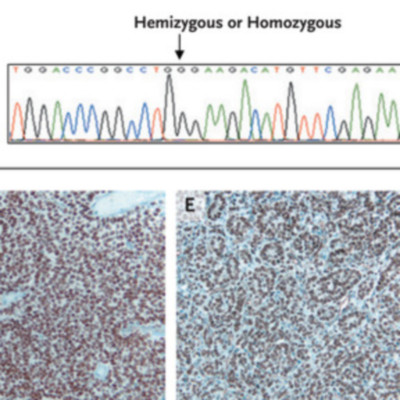Abstract
Granulosa-cell tumors (GCTs) are the most common type of malignant ovarian sex cord-stromal tumor (SCST). The pathogenesis of these tumors is unknown. Moreover, their histopathological diagnosis can be challenging, and there is no curative treatment beyond surgery.
We analyzed four adult-type GCTs using whole-transcriptome paired-end RNA sequencing. We identified putative GCT-specific mutations that were present in at least three of these samples but were absent from the transcriptomes of 11 epithelial ovarian tumors, published human genomes, and databases of single-nucleotide polymorphisms. We confirmed these variants by direct sequencing of complementary DNA and genomic DNA. We then analyzed additional tumors and matched normal genomic DNA, using a combination of direct sequencing, analyses of restriction-fragment-length polymorphisms, and TaqMan assays.
All four index GCTs had a missense point mutation, 402C–>G (C134W), in FOXL2, a gene encoding a transcription factor known to be critical for granulosa-cell development. The FOXL2 mutation was present in 86 of 89 additional adult-type GCTs (97%), in 3 of 14 thecomas (21%), and in 1 of 10 juvenile-type GCTs (10%). The mutation was absent in 49 SCSTs of other types and in 329 unrelated ovarian or breast tumors.
Whole-transcriptome sequencing of four GCTs identified a single, recurrent somatic mutation (402C–>G) in FOXL2 that was present in almost all morphologically identified adult-type GCTs. Mutant FOXL2 is a potential driver in the pathogenesis of adult-type GCTs.
